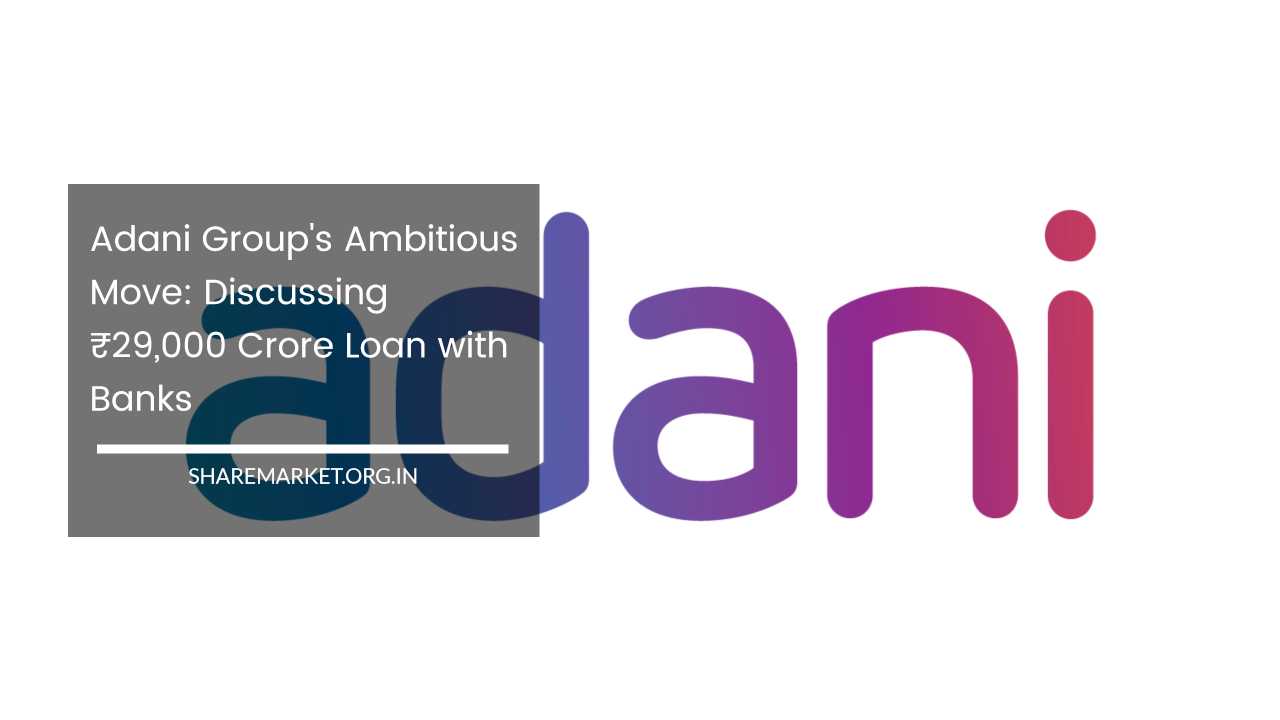Adani Group’s Ambitious Move: Discussing ₹29,000 Crore Loan with Banks

Adani Group
Adani Group’s Ambitious Loan Refinancing: A Detailed Analysis
The Adani Group, led by industrialist Gautam Adani, has recently made headlines by entering into discussions with banks to refinance one of its significant loans. This loan was initially procured to fund the acquisition of Ambuja Cements.
The magnitude of this financial move has garnered widespread attention, as it is expected to be one of the most substantial loan deals in Asia for the year.
This development, disclosed by Bloomberg, a renowned news agency, in a report published on Wednesday, September 13, has drawn the interest of investors, financial analysts, and the business world at large.
In this comprehensive analysis, we will delve into the intricacies of this potential loan refinancing, exploring its significance, the key players involved, the backdrop of the Adani Group’s financial journey, and the potential implications for the future.
The Loan Refinancing Overview
According to Bloomberg’s report, the Adani Group is actively engaged in discussions with several banks to refinance one of its loans.
This loan was originally secured to facilitate the acquisition of Ambuja Cements, a prominent player in the cement industry.
The refinancing, if successful, is expected to amount to approximately $3.5 billion, which equates to roughly Rs 29,000 crore in Indian currency.
Alongside this refinancing endeavor, the Adani Group is planning to allocate approximately $300 million towards the original purchase of the Ambuja Cement plant.
The Context of Adani Group’s Financial Strategy
Before delving further into the details of the loan refinancing, it’s essential to understand the broader context of the Adani Group’s financial strategy and the driving forces behind this ambitious move.
Gautam Adani, the founder and chairman of the Adani Group, is widely regarded as one of India’s most prominent industrialists.
Over the years, the Adani Group has diversified its business interests across various sectors, including energy, infrastructure, logistics, and more.
This diversification has contributed to the Group’s rapid growth and emergence as a major player in the Indian and global business landscapes.
However, the journey has not been without its challenges. The Adani Group faced a significant setback when it came under scrutiny and allegations from the American short-seller firm Hindenburg.
These allegations raised concerns about the Group’s financial practices and triggered a temporary market valuation decline of approximately $150 billion.
It’s important to note that the Adani Group vehemently denied these allegations and consistently defended its financial integrity.
The Loan Refinancing Process
The loan refinancing process undertaken by the Adani Group is a strategic financial move designed to optimize its debt structure and potentially reduce borrowing costs.
By engaging in discussions with banks to refinance its existing loans, the Group aims to secure more favorable terms and conditions, which could ultimately enhance its financial flexibility and position in the market.
Key Players in the Refinancing Initiative
Several major banks are participating in the loan refinancing initiative with the Adani Group. Notable institutions include DBS Group Holdings Ltd, First Abu Dhabi Bank PJSC, Mizuho Financial Group Inc, Mitsubishi UFJ Financial Group, and Sumitomo Mitsui Banking Corp.
These banks are expected to contribute significantly to the refinancing effort, with each providing loans of approximately $400 million.
Furthermore, it’s noteworthy that the lending landscape for this refinancing has been segmented into three categories, with the major lenders listed above leading the charge, while other banks are anticipated to offer comparatively smaller sums.
This segmentation suggests a well-thought-out and structured approach to the refinancing initiative.
Progress of the Discussions
The ongoing discussions between the Adani Group and the participating banks have been characterized by a positive trajectory.
This is a promising sign, as it indicates that the Adani Group is successfully navigating the complexities of loan refinancing and is on the path to achieving its financial objectives.
In light of the earlier challenges posed by the Hindenburg allegations and the subsequent market valuation decline, this progress is particularly significant.
The Potential Impact on Asia’s Financial Landscape
If the loan refinancing deal is successfully concluded, it is expected to stand as one of the most substantial loan transactions in Asia for the year, excluding Japan.
This assessment is based on data provided by Bloomberg, a trusted source of financial information and analysis. The significance of this deal extends beyond the Adani Group itself; it has the potential to influence Asia’s financial landscape by demonstrating the attractiveness of Indian businesses to international investors and lenders.
The Importance of Loan Refinancing
Loan refinancing is a common financial strategy employed by businesses to optimize their debt portfolios and improve their overall financial health.
It involves renegotiating the terms and conditions of existing loans to secure more favorable terms, such as lower interest rates, extended repayment periods, or improved covenants. The primary goal is to reduce the cost of debt and enhance financial flexibility.
In the case of the Adani Group, the decision to pursue loan refinancing is driven by several key factors:
- Debt Optimization: One of the primary reasons for loan refinancing is to optimize the Group’s debt structure. By securing more favorable terms, the Adani Group can reduce its borrowing costs and potentially free up capital for other strategic initiatives.
- Enhanced Financial Flexibility: Improved loan terms can enhance the Group’s financial flexibility, allowing it to better manage its cash flow, invest in growth opportunities, and navigate economic fluctuations.
- Market Reputation: Successfully refinancing a significant loan can boost the Adani Group’s market reputation and credibility, especially following the challenges it faced due to the Hindenburg allegations. It sends a signal to the financial community that the Group is committed to sound financial practices.
- Attracting Investors: Favorable loan terms can make the Adani Group more attractive to both domestic and international investors. This can stimulate investment inflows and support the Group’s growth objectives.
- Competitive Advantage: A well-structured refinancing deal can provide the Adani Group with a competitive advantage in the market, allowing it to better compete with rivals and seize strategic opportunities.
The Potential Implications
The potential success of the loan refinancing initiative by the Adani Group has several implications for the Group itself and the broader financial landscape:
- Financial Resilience: The progress in loan refinancing demonstrates the Adani Group’s financial resilience and ability to rebound from adversity. It underscores the Group’s commitment to addressing financial challenges effectively.
- Market Confidence: A successful refinancing deal can restore confidence in the Adani Group among investors and lenders. It could help reverse the market valuation decline experienced following the Hindenburg allegations.
- Investor Interest: Favorable loan terms may attract increased investor interest in the Adani Group’s businesses. This, in turn, could lead to higher stock prices and valuation growth.
- Sectoral Impact: The Adani Group’s success in securing favorable refinancing terms could have a positive impact on the entire conglomerate sector in India. Other businesses may also explore similar opportunities to optimize their debt structures.
- Global Perspective: This refinancing initiative highlights India’s attractiveness as a destination for international investment. It showcases the willingness of global banks to engage with Indian businesses on significant financial transactions.
- Economic Growth: As the Adani Group continues to expand and invest in various sectors, it can contribute to India’s economic growth and development.
Final Remarks
The Adani Group’s ongoing discussions with banks for the refinancing of a significant loan used in the acquisition of Ambuja Cements represent a pivotal moment in the Group’s financial journey.
This move is not only a strategic effort to optimize its debt portfolio but also a statement of financial resilience following challenges posed by the Hindenburg allegations.
The Adani Group’s progress in these discussions sends a positive signal to the financial community, indicating its commitment to sound financial practices and market integrity.
The potential success of this loan refinancing initiative could have far-reaching implications, from boosting investor confidence to influencing Asia’s financial landscape.
While the deal has not been finalized at the time of writing, it serves as a reminder of the dynamic and evolving nature of the business world, where adaptability and strategic financial moves are crucial for long-term success.
As the discussions continue, all eyes will remain on the Adani Group and its ability to navigate this complex financial terrain.

















